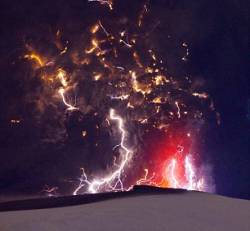
Heathrow and Gatwick have become the latest airports to be closed amid fresh fears about volcanic ash from Iceland.
The Civil Aviation Authority has decided to shut the two key London airports from 1am Monday as a safety precaution.
It follows a day of closures throughout the North and Midlands, rendering much of the UK a no-fly zone.
A no-fly zone was first put in place above parts of Northern Ireland on Sunday and the Civil Aviation Authority later extended the closures, with Manchester, Liverpool,
East Midlands and Glasgow Prestwick, all shut from 1pm.
Air traffic control service Nats tonight said that more airports would be forced to close.
A spokesman said: ‘For the period 1900 Sunday until 0100 Monday, London’s main airports will still be clear of the no-fly zone imposed by the CAA due to the high density volcanic ash cloud.
‘The ash cloud continues to change shape and move further south to just north of Oxford during this period.
‘This brings Birmingham and Norwich inside the no-fly zone in addition to those airports already affected.
‘The northerly extent of the no-fly zone in England now includes Teesside, stopping just short of Newcastle, and tracking north west in a line just north of Carlisle, which remains in the no-fly zone.
‘Airports inside the no-fly zone in England and Wales now include Teesside, Humberside, Leeds Bradford, Blackpool, Ronaldsway, Caernarfon, Liverpool, Manchester, Sheffield, Doncaster, Norwich, Birmingham and East Midlands.
‘In Scotland the no-fly zone includes the Western Isles, Campbeltown, Prestwick and Oban.
‘All airports in Northern Ireland remain inside the no-fly zone during this period.’
Flights in and out of Dublin are also grounded until at least 9am tomorrow and other Irish airports have also been closed by the cloud.
Although they are currently outside the no-fly zone, it’s thought Heathrow, Gatwick, Luton and Stansted in the South could be affected over the next three days.
Forecasters say the cloud is expected to be lying over London by Tuesday but should have drifted out of UK airspace by Wednesday.
No comments:
Post a Comment